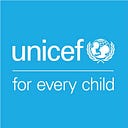In Cameroon, mobilization efforts to prevent new cholera outbreak continue.
In Douala, in the Littoral region of Cameroon, populations face regular cholera outbreaks, UNICEF provided support to an organization called VTCAM (Volontaires pour Tous au Cameroun) for implementation of cholera prevention activities in the most high-risk areas to prevent further outbreaks….
Despite the rainy weather, in Douala, Littoral region of Cameroon, you can find buyers stalling along the market, discussing and arguing prices, looking and exchanging with local retail sellers commonly called “buy’am sell’am”. You can equally find motorcycle and taxi drivers roaming around finding clients to transport them and their goods. This is also the place where meetings and exchanges proliferate, and of course, there is a high risk for contamination starts.
For the past 8 months now, there has been no registered case of cholera in the health districts. However, the risks of contamination remain high in view of certain hygiene practices, and the lack of adequate sanitation infrastructures and access to drinking water is still a problem which makes the population vulnerable to cholera. To avoid a resurge of the epidemic, it is necessary to continue raising awareness in families and communities.
Community Health Workers (CHWs) Spearhead mobilization against cholera
To reinforce messages and best practices, 120 well-trained community health workers and volunteers were deployed to visit families, schools, markets, etc. to meet adults and children in order to exchange with them on cholera preventive measures Specifically in schools pupils were given basic advice on hygienic practices such as handwashing with clean water and soap before and after meals, and after use of latrines to avoid cholera.
In communities, teams, made up of one community health worker and two volunteers are deployed to carry out door to door mobilization of households with key messages focused on cholera prevention and response measures. During home visits, the teams lay emphasis on water purification techniques, the importance of keeping latrines clean, and how to prepare an oral rehydration solution.
Additionally, community engagement meetings are organized to engage community leaders in the prevention and response to cholera in their respective quarters. Also, focus group discussion are organized with special groups such as taxi and motorcycle taxi drivers, bus drivers, food retailers, managers of eating houses. Data collected during these discussions are used to address various issues raised by the communities and to shape messages.
Awareness is further raised through the presentation of video footage showing the sanitation status of the communities. A 13-minute film showing a 13-minute film presenting the WASH situation of at-risk communities arouses a lot of reactions and probably helps bring leaders to commit to the prevention of cholera through the improvement of hygiene and sanitation conditions.
This would hopefully contribute to maintain the current case reduction trend and contribute to the success of a cholera free environment in Douala. Households, children, and society at large are getting familiar with prevention measures. It is therefore essential that behavior change continues to be encouraged to ensure the success of this preventive approaches.
________By Elisa Nadege Bakong, UNICEF Intern in Douala
